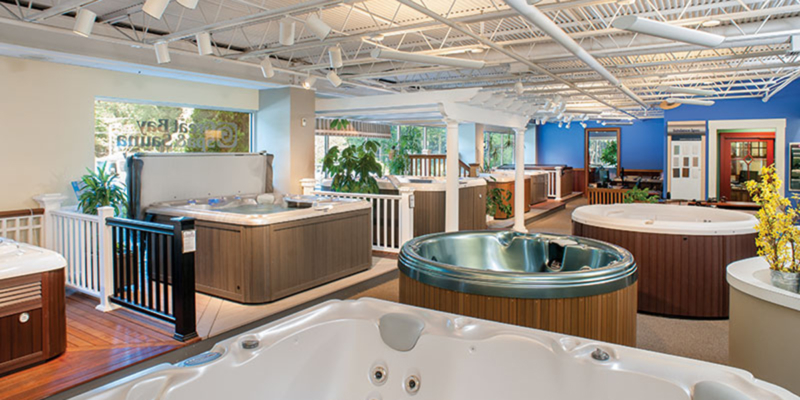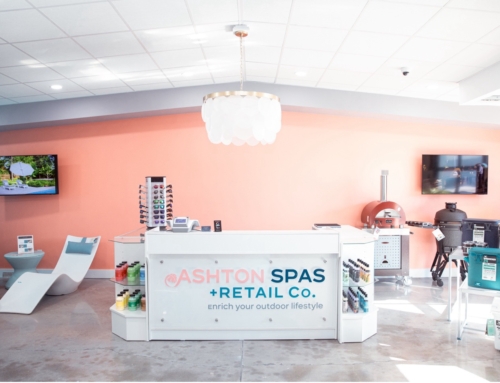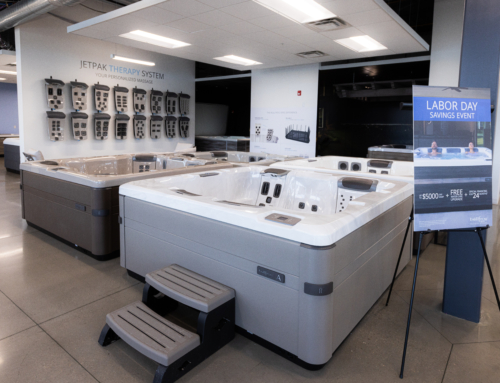In an age where online retail and big-box stores are transforming consumer culture as we know it, is it time for independent retailers to reconsider their brand exclusivity in favor of showroom diversity? Not all retailers seem to think so. In fact, some believe that a singular manufacturing partnership offers the most reward, doubling-down on the notion that nothing beats specialized expertise and identity gained from a one-brand shop.
That’s not to say there aren’t advantages to carrying more than one brand or partnering with multiple manufacturers. As with most business decisions, this one just depends on whether the benefits outweigh the risks for your situation.
The Allure of Multi-Brand Retail
Since carrying multiple brands can mean having more product variety to sell, expanding your showroom to include the hottest names in spa manufacturing is an enticing proposal. The obvious benefit of selling multiple spa brands in your store is the ability to meet the demands of different consumers. You are able to sell to wider income brackets, more varied lifestyles, and broader tastes.
From Portsmouth, NH, Great Bay Spas’ Jamie Burson explains, “We added brands to grow our business, not to take away from other brands we’re selling but to grow them at the same time. The competing brands are different enough where people tend to lean one way or another. It’s like looking at a color: some people may love it, some people hate it…Having both of those premiere brands on the floor allows us to have more customers stay at our store.” Which ultimately turns into the potential for increasing sales.
Beating the Big-Box Stores
Brand diversity can also help compete with the narrower product and price ranges of hot tubs sold by big-box stores. To maximize appeal to their customer base while minimizing costs, the Home Depots and Costcos of the retail world typically hone in one or two hot tub offerings within the lower-to-mid price range.
This begs the question: Can independent hot tub retailers really compete with big box?
The greatest advantage exclusive spa dealers have over big-box culture is expertise, both during the sale and after. While the chain retailers offer convenience and competitive pricing, they lack customer service and product information. They expect their customers care only about value. As such, the stores simply have to stock the item that meets their target price brackets.
However, there are consumers who care more about the products they purchase–especially bigger ticket items like spas and saunas–and require more than a “great deal” to inform their spending. These are the consumers that independent retailers target.
The people at Kmart and Walmart will tell customers to come to our store if they have a problem. Because we know what to do. ~ Debbie DeVault, Pools of Fun
Unlike the price-obsessed consumers looking for the best deals and convenience, these consumers are looking for service. To them convenience is knowing that their retailer will take care of them. In speaking with Aqua Magazine, Debbie DeVault of Pools of Fun in Plainfield, IN, recounts, “The people at Kmart and Walmart will tell customers to come to our store if they have a problem. Because we know what to do…When it comes to customer service, we go above and beyond what people expect.”
This kind of expertise comes from knowing the product you sell. And it’s difficult to argue with that idea of “What better way to understand your products than through an exclusive relationship with the brand?”
The Advantage of Brand Loyalty
For manufacturers, the benefits of strong dealer relationships have long been apparent. In fact, manufacturers have a strong incentive to work closely with local retailers because they are invaluable in creating lifetime customers and even building up the brand itself. On the flipside of the coin, dealers benefit from the brands they represent through the mutual incentive to dominate the competition in the region.
Aaron Hoefle of Leisure Zone in Cedar Rapids, IA, describes the mutually beneficial arrangement. “We feel more loyal to the exclusive brand we represent and that vendor treats us with more loyalty,” he explains. “The brand is less likely to put a second distributor in our territory–they treat us as an extension of their business by strategically working with us to dominate competitive brands in our territory.”
When your vendor has stakes in the number of sales you make, you’re more likely to receive resources and training that helps you move units off the showroom floor. Hoefle describes the advantage of brand support has in training his staff, “It simplifies our learning process. We can become the experts on the brand that we exclusively represent. There is no confusion regarding what feature belongs to one brand and not the other.”
In “becoming the experts,” Hoefle’s team gains a significant edge over their multi-brand competitors. When consumers want a retailer who truly knows his or her product, they turn to people like Hoefle. For these customers, trust and expertise in the product are more valuable than convenience, selection, and price wars.
If You Know Your Brand, You Know Your Consumer
One of the greatest advantages any retail business can have is a firm understanding of its consumer base. Exclusive branding allows retailers to embrace the message, style, and image of their brand, becoming a part of it. And with this synergy comes a shared consumer market.
Additionally, there’s inherent value in exclusivity. It helps you stand by the products you sell, to appreciate them incomparable to any other spa brand on the market. “Customers tend to feel that you really believe in your product and only offer the best when you represent one brand exclusively,” Hoefle explains. “It elevates our company above other retailers when we confidently say we only represent one brand because we only offer the best.”
The reality of single-brand retailing dictates that you cannot meet certain consumer demands.
Though being elite doesn’t necessarily sell more spas, it certainly helps attract specific customers. Therefore, a strong relationship with your vendor can help your showroom embody the brand. And with that embodiment comes consumer trust.
Bridge the Gap or Burn the Bridge?
Multi-brand retailers attempt to reach wider consumer bases by broadening their product selection. Rather than seek out the ideal consumer for a single brand, they play to many tastes at once. Hoefle does admit this as a potential shortcoming of the brand exclusive model his business uses. “We simply cannot meet the needs of all customers. We cannot be ‘all things to all people.’ We do not sell cheap, because we are exclusively the best. Therefore, we lose those sales to other brands.”
Is this necessarily a bad thing, however? Of course, the reality of single-brand retailing dictates that you cannot meet certain consumer demands. But on the other hand, you’re more likely to close sales and retain customers with consumers to whom your brand targets. Like all aspects of business, it’s a give and take.
So, what would it take for someone like Aaron Hoefle to add more brand names to his showroom floor? “The other manufacturers would need to show quantifiable reasons for us to include them. Detail a mutual plan for success.” He explains, “One of the most important considerations would be: will it damage our current relationships with our current preferred manufactures? Would we get less support from them?”
But as a brand exclusive dealer, you’re more likely to close sales and retain customers with consumers to whom your brand targets.
In the current market, Hoefle is not willing to sacrifice the close relationship with his vendor. However, he is not closed-minded to adding more brands to his showroom, admitting, “Obviously, times change. People’s preferences change. The retail climate changes. If there was an overwhelming wave of proof that it would be an advantage to our business, then we would likely make the additions.”
At the end of the day, the decision to expand into multiple-brand retail offers both potential benefit and inherent risk, especially if your business has grown under a single manufacturer. For many independent spa retailers, the advantages of selling to branded niche markets are what keep them competing with big-box and online retail. Whether your business chooses to sell single or multiple brands, small retailers should maintain focus on what they do best: sell luxury spa products with expertise, conviction, and unparalleled service.









Leave A Comment